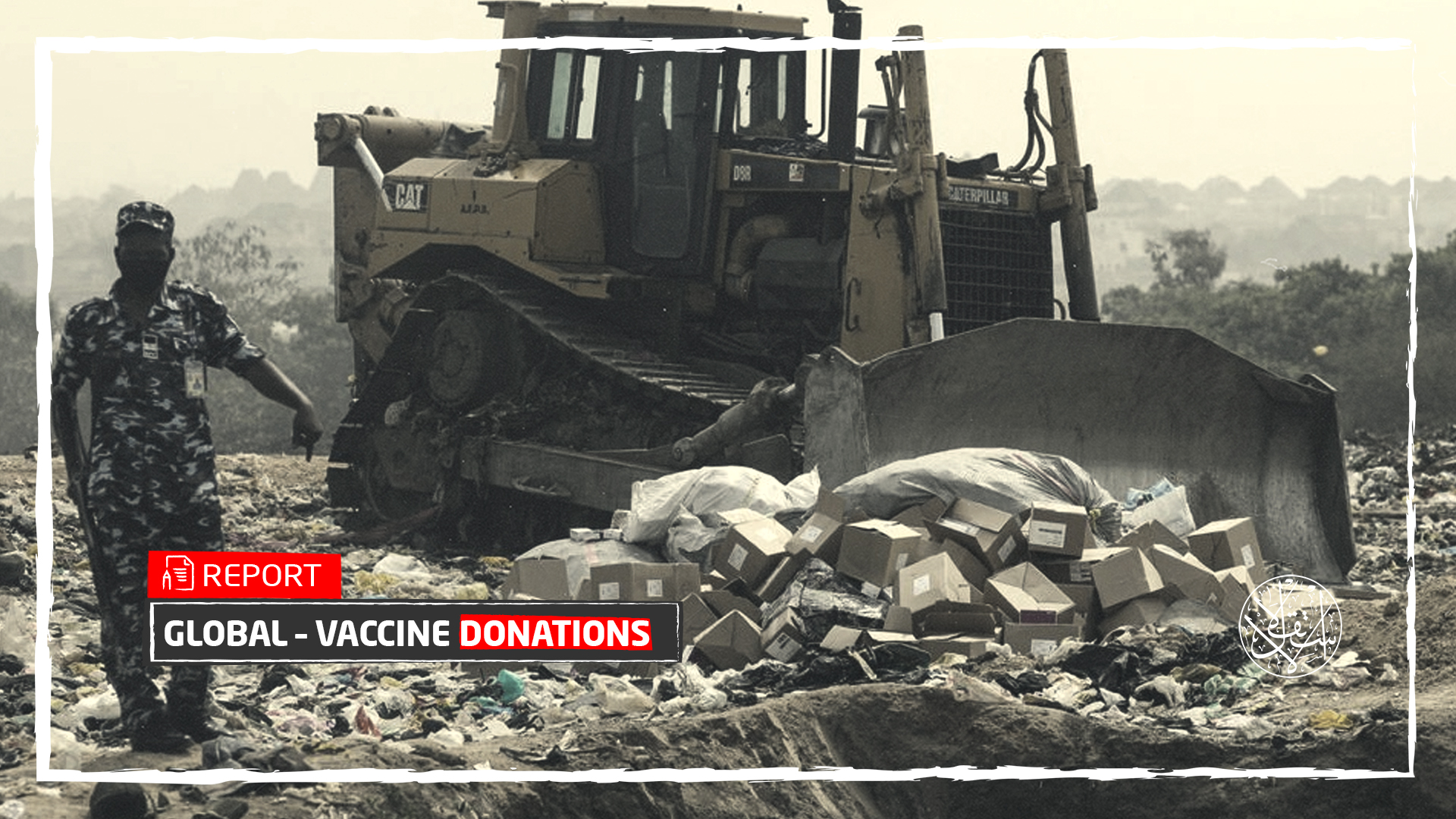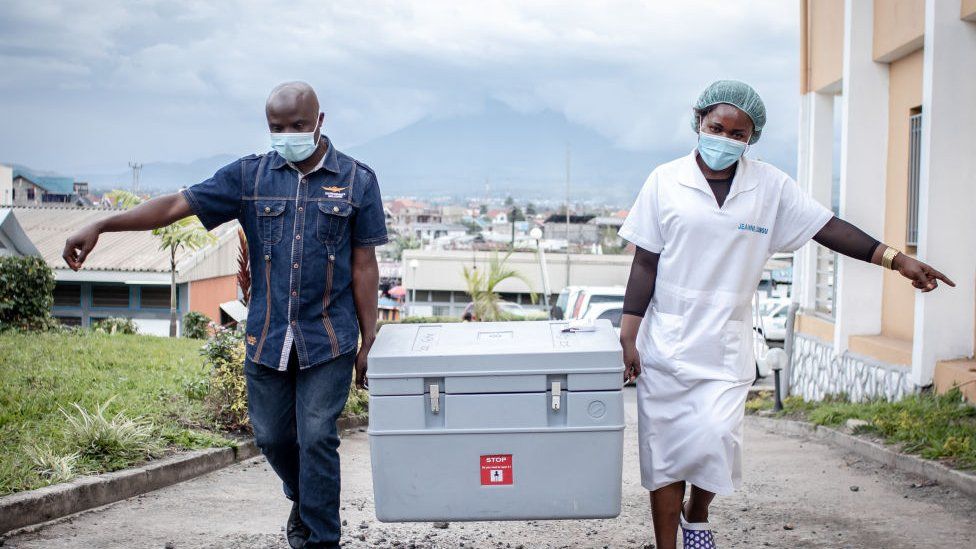Vaccine Donations: International Solidarity or Disposal of Nearly Expired Doses

International calls and pressure for fair and equitable access to vaccination triggered many initiatives aiming to donate vaccines to poor countries.
However, with the increasing numbers of the nearly expired doses received by different poor states, typically in the African continent, questions were raised about the ultimate aim of those donations. Are they a real form of International solidarity against the epidemic, or only a misleading practice to get rid of doses before their expiry date?
The World Health Organization revealed on January 16, that a UN-backed program shipping Coronavirus vaccines to many poor countries has now delivered 1 billion doses, emphasizing that this big step “is only a reminder of the work that remains.”
"It's a major milestone in the largest and fastest vaccine delivery in history," said Seth Berkeley, CEO of the Gavi Vaccine Alliance. This alliance established COVAX in 2020 with both the World Health Organization and the Coalition for Epidemic Preparedness Innovations.
Berkeley indicated that about 90 percent of the distributed doses were funded by donations received by the Gavi alliance, with a total value of more than 10 billion dollars.
On another side, Global Time reported that rich countries “donate” the stockpiled excess vaccines to African countries when their validity is about to expire, for political credits only. Knowing that Africa lacks the storage conditions for vaccines and primary care services, these unusable vaccines are only draining the efforts and budgets of African countries.
The ‘First billion’
On Saturday 15 January, the international COVAX initiative aimed at enhancing poor countries' access to vaccines against COVID-19 announced the end of the distribution of the "first billion" vaccines.
The arrival of 1.1 million COVID-19 vaccine doses to Rwanda on Saturday included the billionth dose supplied via the COVAX program, marking the end of the first billion vaccine distribution program.
COVAX spokesperson Berkeley stressed that he knew how much work still needed to be done “to protect everyone and solve vaccine inequality,” adding: “Our work is not done yet.”
WHO has long denounced the unfair distribution of vaccines and called for manufacturers and other countries to prioritize COVAX. It stated that: “As of January 13, 36 of its 194 member countries had vaccinated less than 10% of their population and 88 had vaccinated less than 40%.”
The program has distributed vaccines to 144 countries so far, WHO said in a statement: “COVAX’s ambition was compromised by hoarding/stockpiling in rich countries, catastrophic outbreaks leading to borders and supply being locked…and a lack of sharing of licenses, technology and know-how by pharmaceutical companies meant manufacturing capacity went unused.”
All countries can order doses through COVAX, but low-income countries get them for free. The COVAX initiative had hoped to distribute two billion doses by the end of 2021, but competition between rich countries willing to keep doses prevented this goal from being achieved.
100 Million Vaccines Rejected
Reuters news agency quoted a UNICEF official stating that the poorer countries rejected last month more than 100 million doses of COVID-19 vaccines distributed by the international initiative COVAX, mainly because of the vaccine’s short shelf life.
"More than 100 million have been rejected just in December alone," Etleva Kadilli, director of the supply division at the UN, disclosed to the European Parliament, adding that the main cause for rejection was their close expiry date.
From its side, the UN children's agency pointed out that of the 100 million vaccines rejected, 15.5 million were deemed to have been destroyed. Some doses were rejected by multiple countries.
The WHO Regional Office in Africa confirmed to Global Times that the destruction of the vaccine in African countries has become a common practice.
Reuters agency pointed out that poor people have become hesitant and not fully convinced about the safety of the distribution and storage processes. As a result, the refusal of getting vaccinated increased and the healthcare systems became overburdened.
Vaccine Destruction
On December 22, 2021, the Nigerian government destroyed more than 1.06 million doses of AstraZeneca vaccine in a landfill on the outskirts of the capital, Abuja. The Nigerian government aimed to assure a wary public that the vaccines have been taken out of circulation.
The destruction took place more than a week after health authorities disclosed that some COVID-19 doses donated by rich Western governments have an expiry date of a few weeks. Thus, the health workers have only weeks to administer the shots.
Reuters reported on December 7 that about one million COVID-19 vaccines were estimated to have expired in Nigeria in November without being used.
According to Global Time, these vaccines were part of the more than 2.59 million doses Nigeria received from Europe in October 2021, which expired in November.
"We have successfully withdrawn 1,066,214 doses of expired AstraZeneca vaccines. We have kept our promise to be transparent to Nigerians. The destruction today is an opportunity for Nigerians to have faith in our vaccination program," Faisal Shuaib, the National Primary Health Care Development Agency executive director said.
In June 2021, BBC reported that Malawi destroyed almost 20,000 doses of the AstraZeneca vaccine, while South Sudan stated it would destroy 59,000 doses.
Disappointment and Fears
Hamza el-Guenouni expert in sociology and researcher at Kent University in Turkey told Al-Estiklal: “Donating vaccines with a short shelf life to Africa generates disappointment and fears. Disappointment, after the increasing false hope about the possibility of countering the spread of the pandemic in the African countries with vaccination. Yet, the African fast capabilities to distribute and administer the vaccines are limited. Consequently, Africans cannot benefit from vaccines of short shelf life even though they are in deep need of them. Which is increasingly disappointing.”
The expert added: “The second challenge is that the African countries not only cannot benefit from these vaccines, but they also need to get into a long process of safe discharge, wasting resources and efforts.”
He emphasized: “The third drawback of receiving a nearly-expired vaccine is the atmosphere of fear they generate. The fear of getting an expired vaccine spreads and pushes people to reject even the good vaccines that can protect them from the virus.”
Sources
- Nigeria destroys 1 mln donated AstraZeneca vaccines with short shelf life
- GT investigates: What’s the use of West-donated COVID-19 vaccines to Africa when millions of doses expire?
- Poorer nations reject over 100 mln COVID-19 vaccine doses as many near expiry
- Covid-19 vaccines: Why some African states can't use their vaccines
- Shame of Rich Countries Sending Expired Vaccines to Africa










